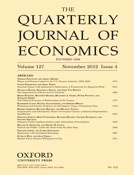
QUARTERLY JOURNAL OF ECONOMICS
Scope & Guideline
Elevating Economic Research to New Heights
Introduction
Aims and Scopes
- Empirical Economic Analysis:
The journal emphasizes rigorous empirical methods, often utilizing large datasets to analyze economic phenomena, such as labor markets, public policy impacts, and consumer behavior. - Theoretical Frameworks:
It provides a platform for theoretical advancements in economics, exploring new models that can explain observed economic behaviors and inform policy. - Interdisciplinary Approaches:
The journal encourages work that intersects with other disciplines, including sociology, political science, and public health, highlighting the multifaceted nature of economic issues. - Focus on Inequality and Social Justice:
A consistent theme is the investigation of economic inequality, social justice, and the impacts of policy decisions on various demographics. - Behavioral Economics:
The journal explores how psychological factors influence economic decision-making, contributing to the understanding of market dynamics and consumer behavior.
Trending and Emerging
- Health Economics and Policy:
There is an increasing focus on the economic impacts of health policies, particularly in the context of public health crises like COVID-19, emphasizing the intersection of health and economic outcomes. - Behavioral Insights in Economics:
Research employing behavioral insights to understand consumer choices and market outcomes is on the rise, reflecting a broader acceptance of psychological factors in economic modeling. - Climate Economics and Sustainability:
Emerging themes around climate change and sustainable economic practices are gaining traction, as researchers explore the economic implications of environmental policies and practices. - Data-Driven Decision Making:
The use of machine learning and big data analytics in economic research is becoming increasingly prominent, allowing for more nuanced insights and predictions about economic behavior. - Social Media and Economic Behavior:
The influence of social media on economic behavior, including consumer choices and market dynamics, is a growing area of interest, reflecting the digital transformation of economies.
Declining or Waning
- Traditional Labor Economics:
While labor economics remains relevant, studies focusing solely on traditional labor market dynamics without considering broader sociopolitical contexts have decreased, as researchers increasingly incorporate interdisciplinary perspectives. - Macroeconomic Stability:
Research centered on macroeconomic stability and traditional monetary policy frameworks has waned, particularly as new economic realities, such as digital currencies and globalization, demand fresh analyses. - Static Economic Models:
There has been a noticeable decline in the publication of static models that do not account for dynamic changes in economic environments, with a shift towards models that incorporate time-varying factors and uncertainties.
Similar Journals
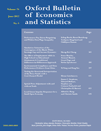
OXFORD BULLETIN OF ECONOMICS AND STATISTICS
Unveiling critical trends in the global economic landscape.The Oxford Bulletin of Economics and Statistics, published by Wiley, stands as a leading journal in the realms of Economics, Econometrics, and Statistics. Since its inception in 1973 and converging through to 2024, the journal has consistently positioned itself in the top quartile (Q1) across multiple categories, including Economics and Econometrics, Social Sciences, and Statistics and Probability, highlighting its influential status in the academic community. With a commendable ranking within Scopus, notably ranked #53 in Social Sciences and #28 in Statistics and Probability, it serves as a critical platform for disseminating rigorous research and innovative methodologies. Researchers, professionals, and students are encouraged to contribute and engage with the high-quality content that defines this esteemed journal, which does not currently offer Open Access but remains a pivotal resource for those seeking to deepen their understanding of economic and statistical paradigms in the pressing global landscape.

ATLANTIC ECONOMIC JOURNAL
Connecting Theory with Real-World ApplicationWelcome to the Atlantic Economic Journal, an esteemed publication in the field of economics, econometrics, and finance, published by Springer. With its inception dating back to 1973 and a significant publication history extending to 2024, this journal has continuously contributed to the discourse on economic theory, policy, and practice. The journal holds a Q3 rank in the latest category quartiles of 2023, showcasing its relevance within the competitive landscape of economic research. Though it does not offer open access options, readers and contributors can expect rigorous peer-reviewed articles that enhance their understanding of economic phenomena and analytical methods. The journal is indexed in Scopus, where it ranks #154 out of 288 in the general economics category, placing it in the 46th percentile. The Atlantic Economic Journal is not just a resource but a platform facilitating the engagement of researchers, professionals, and students in critical economic discussions, furthering knowledge and innovation in the field.
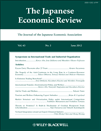
JAPANESE ECONOMIC REVIEW
Bridging research and practice in Japanese economics.Japanese Economic Review, published by Springer Heidelberg, is a renowned academic journal that aims to advance the understanding of economic processes within the context of Japan and the Asia-Pacific region. With an ISSN of 1352-4739 and E-ISSN of 1468-5876, this journal features high-quality research articles that span a broad range of topics in economics and econometrics. Ranked in the Q2 category for Economics and Econometrics as of 2023, it holds a Scopus rank of #332 out of 716, placing it in the 53rd percentile among its peers. Although not Open Access, the journal invites contributions that provide insights and empirical analyses beneficial to both academics and practitioners. Emphasizing a deep understanding of economic dynamics, the Japanese Economic Review is essential reading for anyone interested in the implications of economic policies and trends, making it a significant platform for scholarly dialogue and research dissemination.
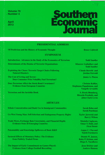
SOUTHERN ECONOMIC JOURNAL
Catalyzing Conversations in Economic Theory and Policy.SOUTHERN ECONOMIC JOURNAL, published by Wiley, serves as a premier platform for scholarly research in the fields of economics and econometrics. With an impressive track record spanning from 1976 to 2024, this journal is esteemed for its contributions to economic theory, empirical research, and policy discussions, making it a critical resource for researchers, professionals, and students alike. Holding a commendable Q2 ranking in its category for 2023, it highlights its influence and standing in the field, ranking #291 out of 716 in Scopus within Economics and Econometrics, placing it in the 59th percentile. While it operates on a subscription model, the journal ensures broad accessibility to its content, fostering academic collaboration and knowledge dissemination. For those striving for a deeper understanding of contemporary economic issues, the SOUTHERN ECONOMIC JOURNAL is a vital resource that enriches the discourse in the economic community.
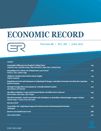
ECONOMIC RECORD
Advancing Economic Insights Since 1925ECONOMIC RECORD is a distinguished academic journal published by Wiley that has been a vital resource in the field of economics since its inception in 1925. With a focus on disseminating high-quality research, the journal covers a broad range of topics within economics and econometrics, making it an essential platform for scholars, professionals, and students alike. Although it currently does not offer open access, the journal is indexed in leading databases and maintains a respectable Q3 category ranking in the Economics and Econometrics field for 2023. The publication operates on a biennial timeline, continuing to contribute significantly to the literature from 1934 to 2024. Researchers will find its rigorous peer-review process ensures that only impactful studies are included, providing a reliable source for current trends and advancements in economic theory and practice. Located in the United Kingdom, ECONOMIC RECORD is dedicated to fostering an environment of academic excellence and innovation in the economics discipline.
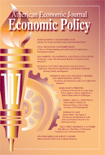
American Economic Journal-Economic Policy
Shaping the Future of Economic GovernanceAmerican Economic Journal - Economic Policy, published by the American Economic Association, stands at the forefront of economic research, focusing on significant policy implications and evidence-based evaluations. With an ISSN of 1945-7731 and an E-ISSN of 1945-774X, this esteemed journal has maintained its influence and credibility in the field since its inception in 2009. Ranked in the Q1 category for Economics, Econometrics and Finance and ranking #7 out of 288 in Scopus, it boasts a remarkable 97th percentile ranking, making it a premier source for cutting-edge research and policy discussion. The journal's rigorous peer-reviewed articles aim to bridge the gap between academic research and real-world economic policy, serving as an essential resource for researchers, professionals, and students who seek to engage with and contribute to the evolving landscape of economic policy. With open access options not currently available, readers are encouraged to subscribe or access articles through academic institutions for comprehensive insights into the economic challenges and innovations shaping our world.
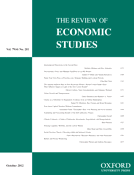
REVIEW OF ECONOMIC STUDIES
Fostering Dynamic Dialogue Among Economic InnovatorsREVIEW OF ECONOMIC STUDIES, published by OXFORD UNIVERSITY PRESS, stands as a premier academic journal in the field of Economics and Econometrics. Established in 1933, it has maintained a strong tradition of scholarly excellence, evidenced by its prestigious Q1 category ranking and its position in the top 93rd percentile among its peers, with a remarkable Scopus rank of #49 out of 716 related journals. This reputable journal aims to publish high-quality research that advances theoretical understanding and empirical knowledge in economics, fostering a dynamic dialogue among researchers, professionals, and students alike. Despite not being an open access journal, the REVIEW OF ECONOMIC STUDIES provides invaluable insights and impactful findings that shape the discourse in the economics community, making it a vital resource for those engaging in rigorous economic analysis and policy-making.

EKONOMICKY CASOPIS
Connecting Theory and Practice in Economic ResearchEKONOMICKY CASOPIS is a distinguished journal published by the Institute of Economics Research SAS and the Institute of Forecasting CSPS SAS, offering a comprehensive platform for the dissemination of innovative research in the field of economics and econometrics. Since its inception in 1978, the journal has been committed to fostering scholarly discourse, showcasing empirical studies, theoretical advancements, and policy analyses that contribute to the understanding of economic phenomena. Although categorized in the Q4 quartile in 2023 and ranking in the lower percentiles within Scopus, EKONOMICKY CASOPIS remains a critical resource for researchers and practitioners seeking to engage with the economic challenges of our time. As the journal continues to evolve through 2024, it invites contributions that align with its objectives of enhancing economic insights and promoting academic discussion in Slovakia and beyond. For researchers looking to publish their work or expand their knowledge, EKONOMICKY CASOPIS serves as a vital resource in the expanding landscape of economic research.
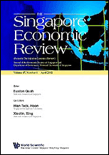
SINGAPORE ECONOMIC REVIEW
Illuminating the evolving dynamics of the global economy.SINGAPORE ECONOMIC REVIEW, published by WORLD SCIENTIFIC PUBL CO PTE LTD, stands as a prominent platform for research in the fields of economics and econometrics since its inception in 1983. With an ISSN of 0217-5908 and an E-ISSN of 1793-6837, this journal caters to a diverse audience by presenting high-quality, rigorously reviewed articles that address pressing economic issues both in Singapore and globally. Currently classified in the Q3 category for Economics and Econometrics for 2023, it ranks #265 out of 716 in Scopus, placing it in the 63rd percentile among economic journals. Although not open access, the articles published here contribute valuable insights into the evolving dynamics of economic theory and practice, making it an essential resource for researchers, educators, and policymakers alike. The journal's commitment to advancing economic research continues to foster dialogue and inspire innovative approaches within the academic community.
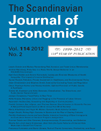
SCANDINAVIAN JOURNAL OF ECONOMICS
Connecting Scholars and Practitioners WorldwideSCANDINAVIAN JOURNAL OF ECONOMICS (ISSN: 0347-0520, E-ISSN: 1467-9442), published by Wiley, stands as a pivotal platform for disseminating research in the fields of economics and econometrics. With an impressive Q1 ranking in both disciplines, this journal plays a critical role in advancing theoretical and applied economic research, catering to an international audience of scholars, practitioners, and students. Its coverage from 1977 to 2024 demonstrates a robust commitment to publishing high-quality research that influences both policy-making and academic inquiry. Although it operates on a traditional subscription model, the journal remains accessible to a broad readership, which is essential for fostering knowledge sharing within the economics community. As such, the SCANDINAVIAN JOURNAL OF ECONOMICS is an essential resource for those seeking to explore the latest developments and methodologies in economic research, helping to bridge practical insights with academic rigor.